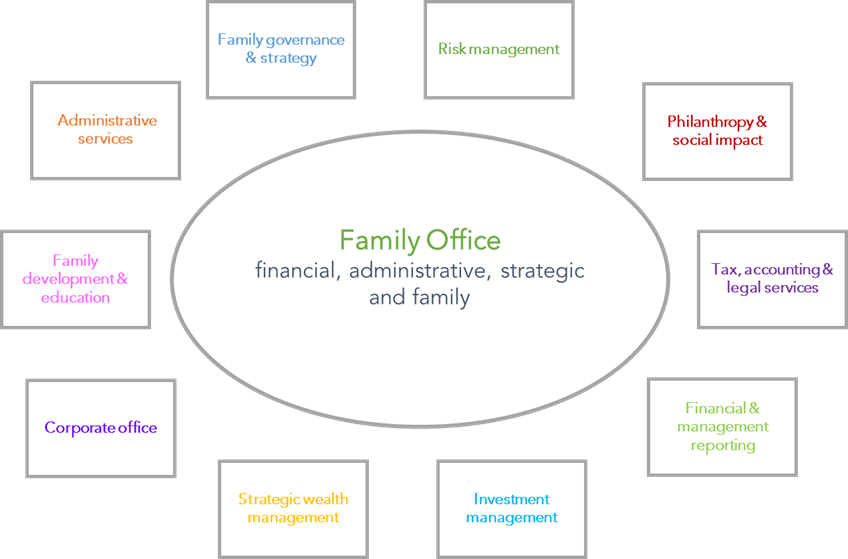Wealth managed by family offices, compared to more traditional wealth managers and financial institutions is growing for a range of reasons but mostly because the office is family centric by design.

I am often asked, “what is a family office?” This article explains the family office models and explores some of key considerations (benefits and services) when evaluating whether establishing a family office is the right choice.
What is a family office?
A family office is a private office that centrally provides services to a family to help them manage their family wealth and activities.
Like each family, a family office takes on its own structure and purpose. At its essence, it is a centralised and coordinated way a family can organise itself and its enterprises, be they financial, business or social.
The concept of establishing dedicated management services for wealthy families is not new, it can be traced back to 6th century aristocracy and royal families. The more modern concept of family offices started to develop with families like the Rockefellers and Vanderbilts making their fortunes during the late 18th and early 19th century and establishing family offices to manage their expanding investments and to provide a range of financial services to family members.
Family offices in Australia
It is estimated globally ~68% of all family offices have only formed in the last 20 years, serving mostly first and second generations. I suspect in Australia many family office have been set up in the last 10-12 years and this newness is a reason why a growing number of families who have created or inherited substantial wealth are keen to understand what a family office actually is and what benefits there are in running one.
It is difficult to determine the exact number of family offices in Australia or their total wealth. According to various reports and industry estimates, there are hundreds of family offices operating in Australia (300+), ranging from single-family offices (SFOs) to multi-family offices (MFOs). A 2019 study by Campden Research estimated the number of family offices globally to be 7,300, up 38% from two years earlier.
A SFO consists of staff hired by the family to be responsible for managing the wealth. A MFO involves the management of multiple wealthy families, who may or may not be related to one another. There are only a small number of multi-family offices in Australia, with most of these established for a particular family and then opened to others.
Choosing between a MFO and a SFO depends on the preferences, goals and resources of a family. MFOs can offer broader services and potential cost savings through shared resources, while SFOs provide more customisation, control, and privacy. Families need to consider factors such as the complexity of their financial affairs, long-term objectives, desired level of involvement and the merits of collaboration with other families before deciding on the most suitable approach.
The hybrid family office
I expect more Australian families will establish their own SFO or create a virtual office given the growing number of professionals providing specialist services to SFOs. Families no longer must choose between a MFO and SFO but will instead structure a private office that combines elements of both to meet the unique needs of their own family, seeking complimentary skills and resources to their family office staff and family members.
It is estimated there are circa 3,800 individuals worth more than US$30m in Australia and this number is expected to grow by 29% over the next five years. Many of these will at some stage seek professional advice concerning the family’s management of its wealth.
When I first started to learn about family offices, $100m and $250m were commonly quoted as the assets needed to justify the costs and effort required to establish a family office and invest together as a family. With the more flexible design of insource and outsourced family office services, I am now seeing families with much lower levels of assets considering a family office.
There is no one-size fits all – each family office can be tailored with the services, staff and scale to evolve along with the family. You often hear quoted, “if you have seen one family office, you have seen one family office.” Family offices do vary, but this is more because the family and its office are at a different stage of development.
What a family office looks like when a business family first starts to build financial assets (outside the business) or when an entrepreneur sells a business and is cashed up - will be very different to a family office that serves two or more generations of a family, that together and separately owns and manages a range of business and family enterprises and activities.
The value of a family office
The benefits and services a family focused office has to offer individuals and their families can be summarised as follows:
- Tailored services - allows for highly personalised and customised services that cater to the unique needs and preferences of the family. The office can provide comprehensive wealth management, financial planning, tax and accounting, estate planning, philanthropy and other services, tailored to the family's specific needs and goals.
- Comprehensive wealth management - offers a holistic approach to wealth management by integrating various aspects of the family's shared and independent financial affairs. They provide oversight and co-ordination of investment assets and structures, ensuring a comprehensive and cohesive strategy across all aspects of the family and its individual members wealth.
- Family governance and legacy - can assist in establishing and maintaining family governance structures and facilitate discussions on succession planning, intergenerational wealth transfer and the preservation of the family's legacy. They help families navigate complex family dynamics, foster communication, and promote unity among family members.
- Expertise and access to networks - typically employs professionals with expertise in finance, investment management, taxation, legal matters, and other relevant fields. They provide access to a network of trusted advisers, industry experts, and specialised resources to support the family's financial decisions and strategic initiatives.
- Privacy and confidentiality - by consolidating financial management and advisory services within a dedicated office, families can maintain a higher level of privacy and confidentiality compared to using multiple external service providers.
- Cost efficiency and control – can provide cost efficiencies by consolidating services and leveraging economies of scale. Additionally, having an in-house team gives the family greater control over their financial strategies, decision-making processes, and the allocation of resources.
- Philanthropy and impact – supporting families in developing and implementing philanthropic and impact strategies. They help identify philanthropic goals, evaluate charitable giving opportunities, establish foundations and manage the family's philanthropic and impact investing initiatives.
So what do wealthy families want and need?
I would say personalisation and privacy are the two of the most common reasons for a family choosing a family office model to manage wealth. Those who provide services and advice to family offices need to be aligned with this and operate in way that can achieve both. This in part explains why more and more experienced professionals are leaving larger institutions and setting up or joining smaller and more dedicated teams that focus on the needs of family offices and the families who have them.
This article’s focus is on the formation of the family office, but I would flag the transition between generations and a significant business liquidity event will have a big influence on the role the family office plays and can even be a reason for the family office not to continue. Transitions within families are tricky, especially the transition out of a business often the hardest. This applies to both entrepreneurs and long running family businesses. Most families and their advisers focus on the business exit and the structuring of the deal but often lack in preparation and planning for the family. This commonly is because the advisers seated at the table are business or technical experts.
In my experience working with private family wealth and business owners, their needs include the following:
- Access to high calibre professionals and advisers to compliment own (family and family office).
- Organising and access to wealth advice and professional services for all the family (with or without family office).
- Access and due diligence of non-listed and illiquid investments, including businesses.
- Maximising the value of business, as well as planning and execution of corporate transactions.
- Effective governance of business and family with the family working together across generations and communicating effectively.
- Planning and management of intergenerational transitions and transfers of wealth and responsibilities.
- Outsourced investment management of financial and liquid assets to a specific mandate that matches goals and risk requirements. The investment strategy may focus on the preservation or growth of the assets or a combination of both.
- Making a positive impact as a family and being socially responsible as a business. Leverage their wealth for social good through philanthropy and social impact investing.
- Education, development and engagement of the rising and younger generations.
- Agreement for the future direction of the family and business, aligned with the shared values purpose and strategy.
The right people, the right skills
Larger families with significant wealth and business interests will at some stage reach a point where they have to build more rigour around the oversight of the family and its wealth. Sometimes this a natural evolution of business resources used by the family and other times it is a more deliberate professionalisation of family skills and resources. No matter what the approach, a more coordinated approach and future planning will go a long way towards achieving stability, shared values and the family’s future success.
Whether a dedicated family office is right for you will depend on the type of support and solutions you are seeking – both financial and family.
What I have learnt from my own personal involvement, is a family and its individuals can benefit by involving advisers alongside the family office at the right time, especially when it comes to some of the family related matters that need some independent and unbiased counsel and facilitation. The family office team tends to more effective with the operational and financial related activities.
I finish with a visual summary of the services a family office can provide a family.

By Jason Chequer, Partner & Head of Advice, Sayers Family & Wealth